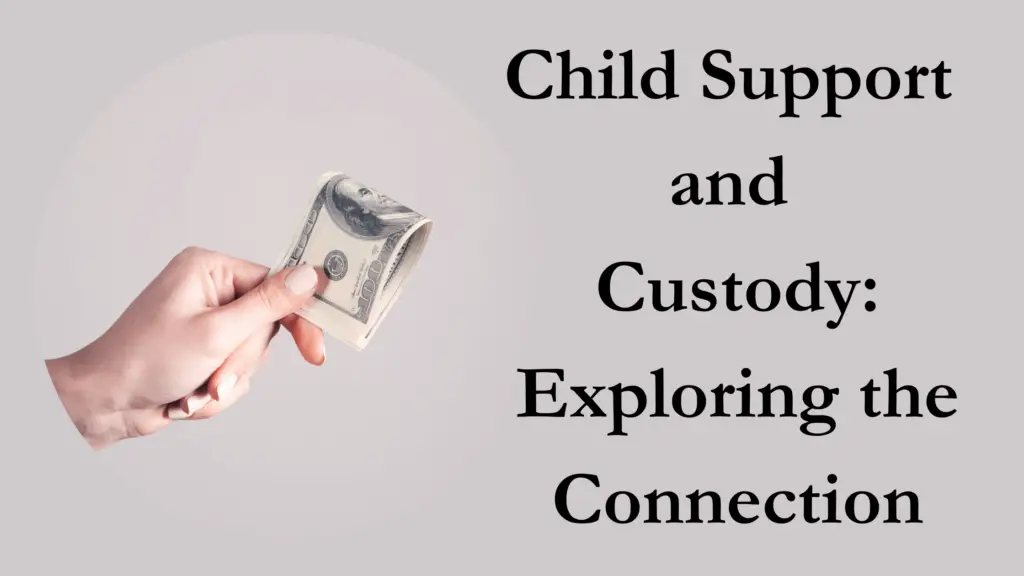Can you lose custody for not paying child support? This is a worry that has disturbed many co-parenting parents. Well, in general, no, you cannot lose custody for not paying child support. Child support and child custody are two separate issues, and the court will not usually take away a parent’s custody rights simply because they are not paying child support. However, there are some exceptions to this rule. For example, if a parent is incarcerated for failing to pay child support, they may lose custody of their child. This is because the incarcerated parent will not be able to provide the physical care that the child needs.
Understanding Child Custody and Child Support
Child custody is a comprehensive legal concept encompassing both the practical and legal authority over a child’s upbringing. This entails determining the child’s residence and who holds the responsibility for crucial decisions regarding education, healthcare, religion, and general upbringing. Custody arrangements can take various forms, such as sole physical and legal custody, joint physical and legal custody, or a combination thereof.
In contrast, child support pertains to the financial dimension of parenting. It constitutes the monetary contribution that non-custodial parents are legally mandated to provide for their child’s care and well-being. The primary objective of child support is to ensure that both parents continue to provide financial support for their child, even when they do not share physical custody.
Legal Consequences of Non-Payment
There are legal consequences that can arise when child support payments are not made as ordered by the court. They include:
Wage Garnishment
Wage garnishment is a common enforcement mechanism used to ensure the consistent payment of child support. Under this process, child support payments are deducted directly from the non-custodial parent’s paycheck before they receive their wages. This method helps guarantee a steady flow of financial support for the child.
Asset Seizure
In cases where non-payment persists, the courts may resort to asset seizure as a means of satisfying the child support debt. This could involve the seizure of property or assets owned by the non-custodial parent to cover their outstanding child support obligations.
License Suspension
Some jurisdictions employ the suspension of various licenses, such as driver’s licenses and professional licenses, as a consequence of failing to pay child support. This measure can significantly impact the non-custodial parent’s ability to work and, in turn, their capacity to provide financial support for their child.
Imprisonment (Where Applicable)
While imprisonment is considered a last resort, it can be a consequence of repeated and willful non-payment of child support in certain jurisdictions. It’s important to note that most courts aim to avoid this outcome, preferring enforcement measures that enable parents to meet their financial obligations without resorting to incarceration.

Can You Lose Custody for Not Paying Child Support
It’s important to clarify that non-payment of child support, in itself, does not automatically result in the loss of custody. Child custody decisions are primarily based on the best interests of the child, considering factors such as the child’s emotional and physical well-being, stability, and the quality of the parent-child relationship.
Courts prioritize the best interests of the child when making custody determinations. Their primary goal is to ensure that the child has a safe, stable, and nurturing environment in which to grow and thrive. While child support is crucial for the child’s financial well-being, it is just one component of the larger picture.
Instances Where Non-Payment May Be Considered in Custody Evaluations
While non-payment of child support alone may not lead to a change in custody, there are situations where it could be a factor considered by the court:
- Financial Hardship: If the custodial parent can demonstrate that non-payment is causing financial hardship that directly impacts the child’s well-being, a court may consider this as a factor in custody evaluations. This could include situations where the custodial parent is struggling to provide for the child’s basic needs due to non-payment.
- Pattern of Non-Payment: Repeated and willful non-payment of child support over an extended period may raise concerns about the non-custodial parent’s commitment to providing for their child. Courts may take this into account when assessing the parent’s ability to meet the child’s needs.
- Non-Payment as Part of a Larger Pattern: Non-payment may be part of a larger pattern of behavior that raises questions about a parent’s ability to meet the child’s needs, including emotional support and involvement in the child’s life. In such cases, it could be a factor considered during custody evaluations.
Read About: How to Protect Your Inheritance from Child Support
The Process of Modifying Custody
In situations where the non-payment of child support is detrimentally affecting the child’s well-being, the custodial parent may pursue a custody modification as a recourse. This legal procedure entails formally requesting an alteration in the existing custody arrangement with the overarching objective of better serving the child’s best interests.
It’s important to recognize that both custody and child support arrangements are typically established and mandated through court orders. Consequently, any proposed amendments to these orders should adhere to the established legal process. Attempting to modify custody without the necessary legal approval can potentially give rise to legal entanglements and future challenges.
The process of modifying custody arrangements is a multifaceted legal undertaking that demands meticulous consideration and, often, the assistance of legal expertise. Therefore, it is advisable for both custodial and non-custodial parents to seek counsel from an experienced family law attorney when embarking on this endeavor. Such an attorney can offer invaluable guidance pertaining to the legal prerequisites, potential outcomes, and the sequential steps entailed in the pursuit of a custody modification. Their expertise can be instrumental in ensuring that the process is effectively navigated in a manner that is conducive to the child’s best interests.

Protecting Your Rights and the Child’s Best Interests
It is of utmost importance to place the best interests of the child at the forefront and faithfully adhere to court-issued directives concerning child support. Responsible parenting encompasses both providing financial support and offering emotional care to your child.
In order to steer clear of the legal repercussions associated with non-payment and the potential emergence of custody disputes, it is imperative to proactively address any child support matters. This proactive approach may entail engaging in negotiations for a modified child support order should your circumstances undergo alterations, such as a loss of employment or a change in income.
In cases where child support or custody concerns evolve into contentious or intricate situations, it is strongly advised to seek the counsel of a family law attorney. An attorney can serve as a knowledgeable guide, helping you comprehend your legal rights, obligations, and the array of legal avenues available to you. They can also furnish invaluable guidance on effectively navigating the legal system while safeguarding both your interests and those of your child.
Ultimately, the well-being of your child should always remain your paramount concern. Irrespective of the obstacles you may encounter, nurturing a healthy and loving relationship with your child is of paramount significance. Cultivating and sustaining this bond can positively influence the emotional and psychological development of the child, a pivotal aspect taken into account during any custody evaluation.
Conclusion
While non-payment of child support can have legal consequences, it does not automatically result in the loss of custody. Custody decisions are made based on the child’s best interests, and the courts consider various factors when evaluating custody arrangements. To protect your rights and the well-being of your child, it’s essential to approach child support and custody matters responsibly and seek legal guidance when needed. By doing so, you can navigate these complex issues while ensuring the best possible outcomes for your child’s future.







